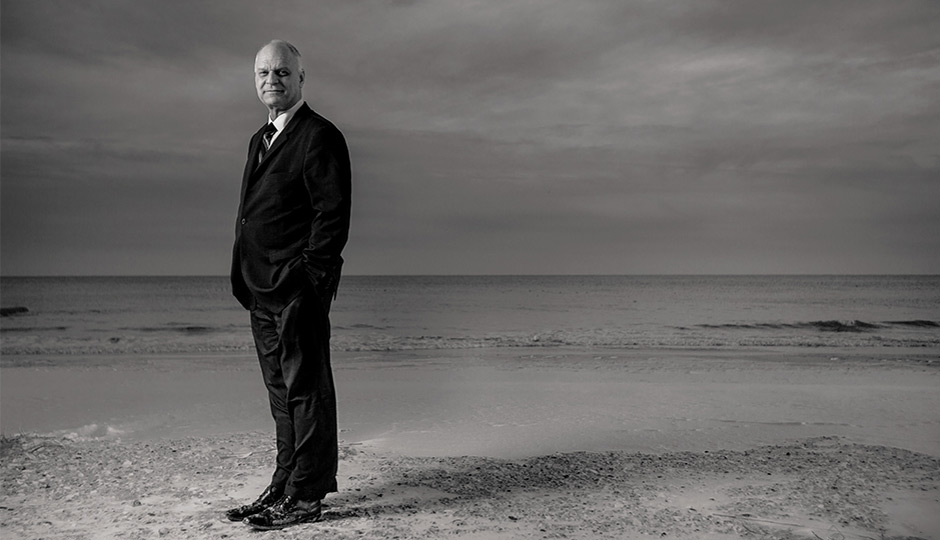Atlantic City’s New Don

No day at the beach: With A.C.’s troubles, Guardian has his work cut out for him
Photo by Colin Lenton
Long after most of the other dignitaries—particularly the white ones—have quietly exited, Mayor Don Guardian remains in a front pew at St. James African Methodist Episcopal Church on Arctic Avenue in Atlantic City.
The ceremony honoring Dr. Martin Luther King Jr. is two hours in, and shows no signs of stopping soon. The tenor and message of the ceremony would be familiar to anyone who has spent time in an African-American church in a city with as many problems as Atlantic City. There is talk of the progress made toward equality, and the challenges that remain, but also frequent mentions of street violence, unemployment, poverty and hard times.
Speaker after speaker looks Guardian’s way. Welcome, Mayor, they say to the tall, white, impeccably dressed Republican with a brown homburg in his lap. Their voices are warm, the overtures are clearly genuine—and yet there’s an unmistakable undercurrent of bewilderment, as though they’re not entirely sure how Guardian came to be sitting there.
For good reason. How could Guardian possibly be the choice of a town where Democrats outnumber Republicans nine to one, and the demographics resemble those of eastern North Philadelphia? How could a gay political neophyte with strong ties to the not-entirely-loved casino industry conceivably beat out a thrice-elected African-American incumbent?
But that’s exactly what happened last November 5th, when Guardian defeated Lorenzo Langford by a final margin of 433 votes. “It’s taking a while to digest,” says William Marsh, a longtime Langford confidant and president of the entirely Democratic City Council. “It’s taking some time to get the actuality of it.”
Not for Guardian. As he takes the podium at St. James, the 60-year-old mayor appears entirely at ease. King, he tells the crowd, “walked these streets, preached from our churches, stood on our Boardwalk.”
Then he pivots. “We come today to talk about how far we’ve come. But really, forget about that. What we have to talk about is how far we still need to go.” The congregation murmurs its assent. “Let us all not just pray for peace,” Guardian says, “but work as well.”
The work ahead in Atlantic City is so vast, it may well prove insurmountable. Three years ago, I wrote an article for this magazine titled “Atlantic City’s Last, Last, Last, Last, Last, Last Chance.” Since then, matters have only gotten worse.
In mid-January, the Atlantic Club Casino Hotel closed, putting 1,600 people out of work in one day. The new Revel, once touted as Atlantic City’s savior, went through bankruptcy and now resembles a sumptuous ghost town, with bored shopgirls checking their nails and rows of empty tables at the three Jose Garces restaurants.
Intense competition from casinos in Pennsylvania, New York and Delaware is crushing Atlantic City’s gaming economy, and that in turn threatens to deal a Detroit-style deathblow to Atlantic City itself. Since 2008, the city’s tax base has shrunk by a third, as casinos win steep cuts in their property tax assessments. This year, the city must close a projected budget deficit of $40 million. And raising taxes is out of the question: Rates went up 22 percent last year alone.
Atlantic City’s residents have long had a chip on their shoulder, owing to the fact that so much of the money made there seems ultimately to benefit people outside the impoverished municipal boundaries. The city’s relationship with its casinos is fraught and complicated. The distrust between city government and the county and state runs deep.
But with Guardian, Atlantic City’s voters chucked all that aside.
“When you have a city that’s nine-to-one Democrat vote for a Republican, that’s amazing,” says South Jersey power broker and state Senate president Stephen M. Sweeney. “That’s a cry for help.”
GUARDIAN IS HOLDING the key to City Hall, but he’s struggling to actually enter the building. He briskly circles about, looking for a way in while adding to his to-do list at the same time. “There,” he says, pointing at a bleak concrete plaza, “we’re going to tear all that out, make it green, make it inviting.”
For the past 20 years, Guardian has worked for Atlantic City’s Special Improvement District, essentially a much smaller version of Philadelphia’s Center City District, run by Paul Levy. And indeed, Guardian has occupied a role in Atlantic City not unlike Levy’s in Philadelphia. He’s friendly with business interests, deeply concerned with tax policy, and obsessively focused on maintaining and improving order and appearance. As is the case with Levy, people have lobbied him to run for mayor for years. Like Levy, Guardian always demurred.
Two things changed Guardian’s mind. One was Atlantic City’s terrifying descent in recent years. The other was the success the Casino Reinvestment Development Authority has had in providing basic public services in the large state-run tourism district—a success that owes much to Guardian.
In 2011, the CRDA subsumed the far smaller Special Improvement District Guardian had run. Guardian kept his job, though, and indeed, he became responsible for sprucing up the entire tourism zone, which encompasses about half the city.
“It took us a few weeks to figure out how to clean half the city on a daily basis with just four guys and some equipment,” Guardian tells me. He began to think, “If we can do it for half the city, then I can do it for the whole city.”


